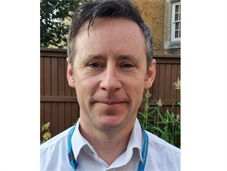World Suicide Prevention Day
10 September 2021 - Kieran Quirke, Associate Director of Nursing for Mental Health, provides some guidance on suicide prevention.

Today (10 September), is World Suicide Prevention Day. We spoke to Kieran Quirke, Associate Director of Nursing for Mental Health here at King’s for advice on helping those in crisis.
“At King’s, our services have a long history of treating and caring for survivors, their families and carers, and the families of those who have died. Many of us will reflect today on the staff and patients we have lost, but today is as much about remembrance as it is about hope; the day underlines that suicide is a preventable act and sometimes just a simple conversation, one we are all capable of facilitating, could make all the difference.
“If someone doesn’t seem quite themselves, there are some signs that might be very obvious – a person explicitly making suicidal statements, for example, or describing feelings of hopelessness. However, many will not be as clear. Sudden changes in behaviour, out-of-character irritability, or a person becoming increasingly withdrawn from family and friends might all be signs of concern. In essence, this is about recognising someone is having a difficult time and asking them how they are.
“My advice on offering support to someone that you think might be struggling to cope is to firstly make time to ask if they’re okay. People can feel very afraid of starting conversations, as they might worry they won’t know the right thing to say, or feel they don’t have the right skills. You don’t need to have all the answers – just giving people permission to speak and to talk through how they’re feeling can be hugely powerful. And if you are concerned the person you are speaking with might be suicidal, it’s important to ask them directly.
“Look out for your family, friends and colleagues. If you notice a change in someone close to you, start a conversation – you might make all the difference.”
If you feel like you need help or want to talk to someone there’s support available from charities such as Mind, The Samaritans and CALM, as well as your GP.
